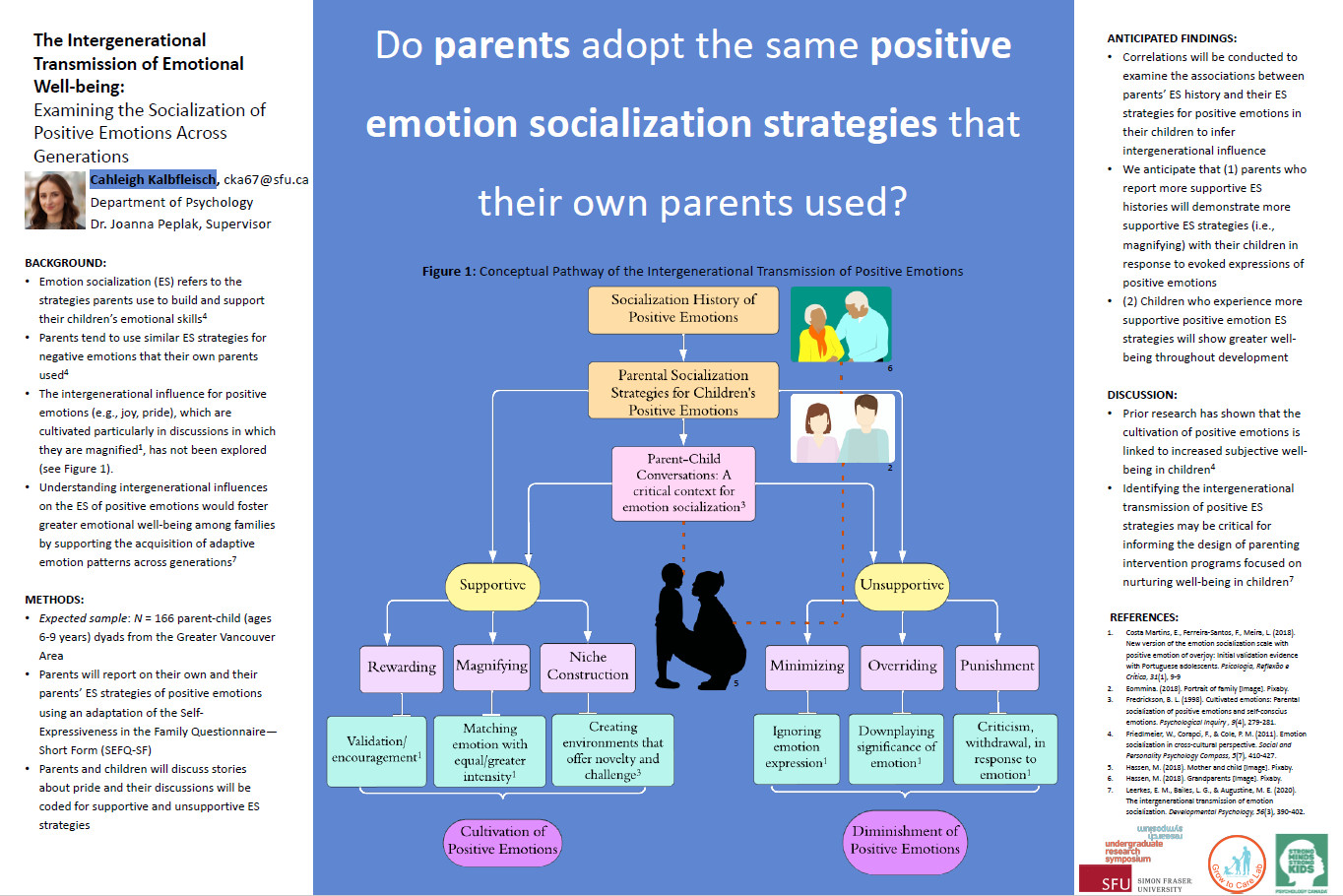Intergenerational Transmission of Emotional Wellbeing: Examining the Socialization of Positive Emotions Across Generations
Main Article Content
Abstract
Emotion socialization (ES; i.e., strategies that minimize, dismiss, magnify, or reward emotions) are influenced by parents’ own understanding and expression of emotions, which is shown to be a function of their socialization history (i.e., strategies used by their parents; Leerkes et al., 2020). Intergenerational ES research has focused almost exclusively on negative emotions (e.g., anger, sadness). However, positive emotions are critical for wellbeing and positive relationships (Costa Martins et al., 2018). Importantly, unlike negative emotions that are managed to promote effective regulation, positive emotions (e.g., joy, gratitude, pride) are cultivated primarily in discussions in which they are magnified (i.e., reciprocating the emotion with equal or greater intensity), particularly in Western cultures (Fredrickson, 1998). Our research will explore the role that parental socialization histories play in shaping their own strategies to socialize positive emotions in their children in the context of parent-child conversations. In this study, 80 parent-child pairs will be recruited from the Greater Vancouver Area, focusing on children ages 6-9 years (a critical developmental period for emotion development; Peplak et al., 2023). Parents will complete a questionnaire, in which they will report on their own parents’ ES strategies of positive emotions (including pride). Parent-child pairs will then discuss emotionally evocative stories. We will code conversations for supportive and unsupportive emotion socialization strategies. A correlational analysis will be conducted to examine the association between parents’ emotion socialization history and their socialization of positive emotions, from which intergenerational influence can be inferred. Preliminary findings will be presented and discussed.
Faculty Supervisor: Dr. Joanna Peplak, Department of Psychology, Simon Fraser University
Article Details

This work is licensed under a Creative Commons Attribution-NonCommercial-NoDerivatives 4.0 International License.
References
Costa Martins, E., Ferreira-Santos, F., & Meira, L. (2018). New version of the emotion socialization scale with the positive emotion of overjoy: initial validation evidence with Portuguese adolescents. Psicologia, Reflexão e Crítica, 31(1), 9–9. https://doi.org/10.1186/s41155-018-0090-3
Fredrickson, B. L. (1998). Cultivated Emotions: Parental Socialization of Positive Emotions and Self-Conscious Emotions. Psychological Inquiry, 9(4), 279–281. https://doi.org/10.1207/s15327965pli0904_4
Leerkes, E. M., Bailes, L. G., & Augustine, M. E. (2020). The Intergenerational Transmission of Emotion Socialization. Developmental Psychology, 56(3), 390–402. https://doi.org/10.1037/dev0000753
Peplak, J., Bobba, B., Hasegawa, M., Caravita, S. C. S., & Malti, T. (2023). The Warm Glow of Kindness: Developmental Insight into Children's Moral Pride across Cultures and Its Associations with Prosocial Behavior. Developmental Psychology, 59(12), 2320–2332. https://doi.org/10.1037/dev0001613
Tracy, J. L., & Robins, R. W. (2007). The Psychological Structure of Pride: A Tale of Two Facets. Journal of Personality and Social Psychology, 92(3), 506–525. https://doi.org/10.1037/0022-3514.92.3.506

